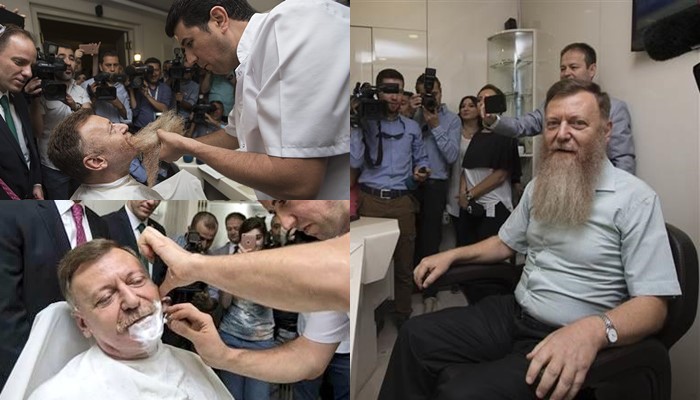Main opposition Republican People’s Party (CHP) deputy Aytuğ Atıcı on Thursday ended a protest in which he refused to cut his beard because of a state of emergency in Turkey, on the same day the state of emergency was lifted, the state-run Anadolu news agency reported.
The CHP deputy had his beard, which had reached a length of 31 centimeters, cut off by the barber at the Turkish Parliament.
“I wish the state of emergency had not been so long and that i didn’t have this kind of record,” Atıcı told reporters.
“The state of emergency has not been lifted but made permanent for three more years,” Atıcı added, recalling a bill presented in Parliament on Monday by Turkish President Recep Tayyip Erdoğan’s Justice and Development Party (AKP) to replace security measures enforced during the soon-to-end state of emergency.
“The AKP has tried to wipe out everybody who opposes it during the two years of the state of emergency. They plan to wipe out the remainder in the next three.”
According to the new bill governors will be authorized to ban people who are considered to be disturbing the public order from entering or leaving designated city locations for up to 15 days.
Governors will also be able to ban public gatherings and to reorganize traffic zones on security concerns. Additionally, they will have the authority to prohibit gun ownership for specified individuals and the transportation of guns.
The bill changes the length of detention for suspects accused of organized crime to four days, a reduction from the seven-day limit under the state of emergency, before which it was two days.
Another regulation the bill foresees is that with a court order or a condition deemed an emergency regarding security measures the military is authorized to search a suspect’s person, car, documents and belongings.
A report by Bianet on Wednesday revealed that 134,144 people were dismissed from their jobs and 228,137 were arrested during the two years of the state of emergency.
A total of 45,415 social media accounts were investigated, and legal action was taken against 17,089 social media users on charges including propagandizing for and praising a terrorist organization; openly declaring relations with terrorist organizations; inciting the public to enmity and hatred; insulting state officials; targeting the indivisible integrity of the state and people’s safety; and engaging in hate speech.
A total of 2,271 private educational institutions were closed. The licenses of 21,860 executives, educators, teachers, specialized instructors and other personnel were cancelled, and regulations were introduced to prevent the people in question from obtaining licenses to work at private educational institutions.
Forty-seven private medical centers, 174 media organizations, 1,414 nongovernmental organizations and associations, 145 foundation 15 universities and 19 unions, which were members of two confederations, were closed.
Trustees were appointed to 99 municipalities, 94 of which were of governed by the Democratic Regions Party (DBP), four were run by the Justice and Development Party (AKP) and one by the Nationalist Movement Party (MHP).
According to Bianet’s Media Monitoring Report, 100 journalists were sent to prison in the wake of the July 15 coup attempt in 2017 alone. The figure was 31 in 2016. The number of imprisoned journalists reached 131 on Jan. 1, 2018. At the moment, 127 journalists are still in prison.

